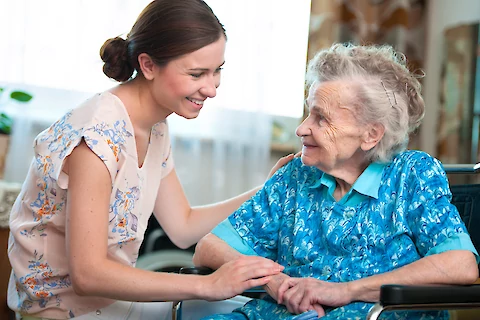
Sundowning, a common phenomenon experienced by seniors with dementia, can bring increased confusion, restlessness, and agitation later in the day such as in the late afternoons or evenings. As a caregiver or family member, addressing and managing sundowning is essential for the well-being of both you and your senior loved one. Learn the causes of sundowning and valuable tips to help you navigate this challenging aspect of dementia care.
Understanding the Causes of Sundowning
Sundowning in seniors with dementia can often be attributed to several factors.
- Disrupted circadian rhythms can interfere with their ability to differentiate between day and night, leading to increased confusion in the evenings.
- Sensory overload from noise, clutter, or crowds can exacerbate the symptoms of sundowning.
- Fatigue and exhaustion from the day's activities can also contribute to restlessness and agitation.
- Lastly, physical and mental health issues, such as pain or anxiety, can worsen sundowning symptoms.
Strategies to Address Sundowning in Seniors with Dementia
One effective way to manage sundowning is by establishing a consistent daily routine. Routines provide structure and familiarity for seniors with dementia, which can be especially comforting during the evening hours. To create a daily schedule, consider including activities that your loved one enjoys and can perform independently, such as walking, gardening, or doing puzzles.
Encouraging physical activity and mental stimulation is another crucial element in addressing sundowning. Exercise has been shown to improve sleep, mood, and overall cognitive function in seniors with dementia. Incorporate activities that are both enjoyable and appropriate for your loved one's ability level, such as chair exercises, dancing, or supervised walks.
Creating a calm and soothing environment can also help alleviate the symptoms of sundowning. Reduce sensory overload by limiting noise and distractions, decluttering the living space, and utilizing soft lighting in the evenings. Familiar items, such as photographs or a favorite blanket, can also provide comfort and promote relaxation.
Additionally, ensuring proper nutrition and hydration can play a vital role in managing sundowning. A well-balanced diet rich in fruits, vegetables, and whole grains can help maintain optimal cognitive function. Also, encourage your loved one to stay hydrated throughout the day and consider offering smaller, more frequent meals in the evening to prevent any sudden drop in blood sugar levels.
Finally, consult with healthcare professionals to explore medication and non-pharmacological interventions that may help manage sundowning symptoms. Appropriate use of medications, as well as alternative therapies like aromatherapy or music therapy, can be beneficial when used under professional guidance.
Tips for Supporting Dignity and Independence in Seniors with Dementia
Fostering independence and promoting self-care can contribute to a sense of dignity for seniors with dementia. Encourage your loved one to perform tasks on their own as much as possible, while assisting when necessary. And break down tasks into smaller steps and offer guidance or cues without taking over completely.
Providing emotional support and validation is also essential in caring for seniors experiencing sundowning. Show empathy and understanding by acknowledging their feelings and validating their emotions. Maintain open and effective communication, using simple language and speaking clearly.
Seeking professional help and support is also crucial for both caregivers and seniors with dementia. A strong support network can make a world of difference in coping with the challenges of caregiving. Reach out to local resources, such as support groups or adult day centers, to access services tailored for seniors with dementia and their caregivers.
Senior Helpers Santa Rosa Wine Country Helps Seniors With Sundowning Symptoms
Addressing and managing sundowning in seniors with dementia is vital for their well-being and the well-being of their caregivers. By implementing the strategies and tips provided in this article, you can create a supportive environment that promotes calmness and dignity for your loved one. For those living in Santa Rosa, Ukiah, Sebastopol, and Rohnert Park, CA, consider reaching out to Senior Helpers Santa Rosa Wine Country for professional assistance and support in caring for your senior relative with dementia.